Financial Decision Making Report - Financial Analysis of Skanska PLC
VerifiedAdded on 2022/11/30
|11
|3802
|111
Report
AI Summary
This report examines financial decision-making within Skanska PLC, a British construction company, focusing on the conceptual framework of accounting and finance, and the evaluation and interpretation of financial statements. The report highlights the importance of financial management in assessing a company's financial condition, emphasizing the roles of accounting and the finance department in strategic planning, cost management, and decision-making. It discusses the significance of financial ratios like Return on Capital Employed, Net Profit Margin, and Current Ratio in analyzing market productivity and financial performance. The analysis covers the importance of various financial functions like capital generation, operational management, and cash flow control. The report further explores the roles and responsibilities within the finance team, including the account manager and finance manager, to ensure effective financial planning, management, and decision-making. The report concludes with a detailed ratio analysis, which helps to draw conclusions about a company's operational pattern and financial data.

FINANCIAL DECISION
MAKING
MAKING
Paraphrase This Document
Need a fresh take? Get an instant paraphrase of this document with our AI Paraphraser
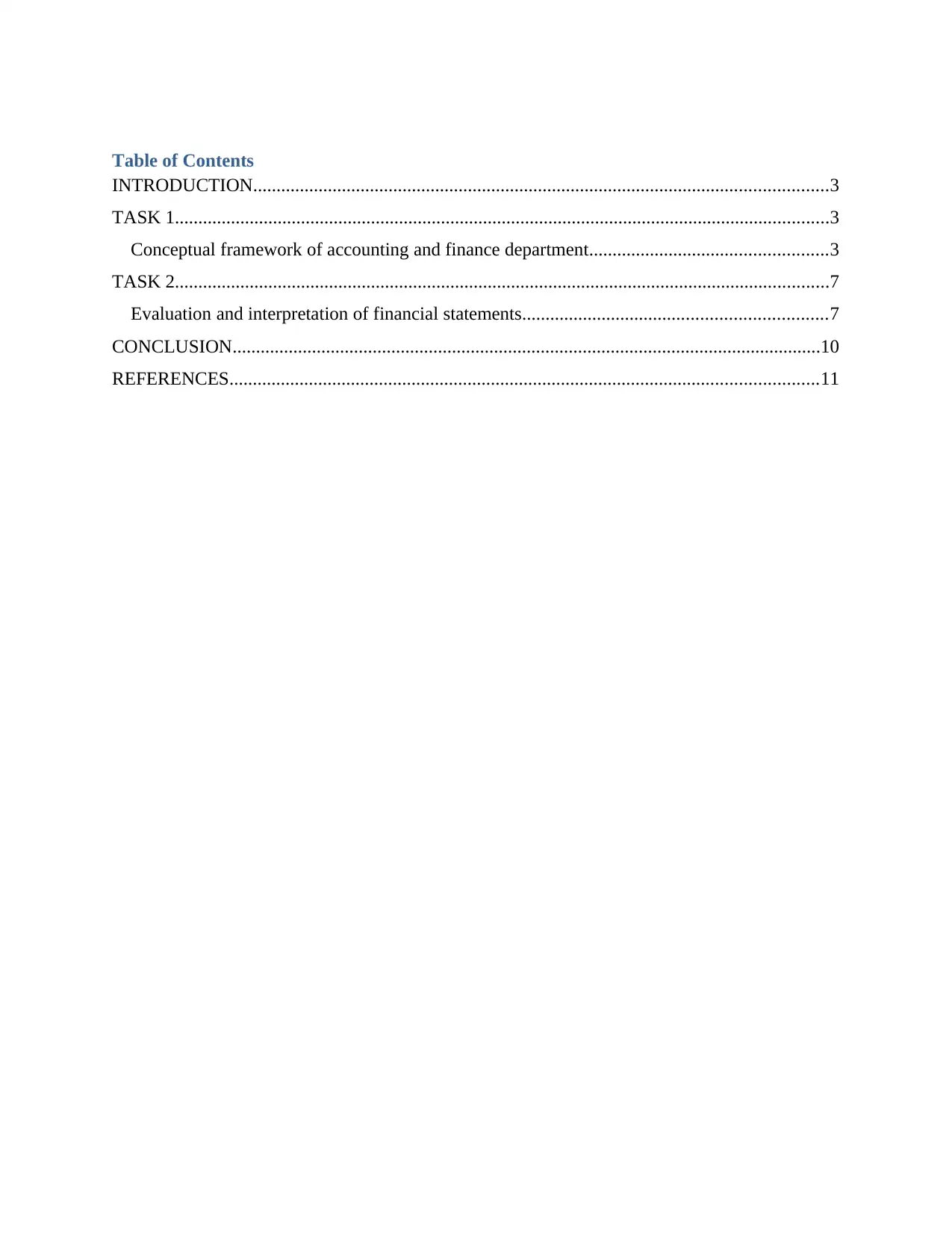
Table of Contents
INTRODUCTION...........................................................................................................................3
TASK 1............................................................................................................................................3
Conceptual framework of accounting and finance department...................................................3
TASK 2............................................................................................................................................7
Evaluation and interpretation of financial statements.................................................................7
CONCLUSION..............................................................................................................................10
REFERENCES..............................................................................................................................11
INTRODUCTION...........................................................................................................................3
TASK 1............................................................................................................................................3
Conceptual framework of accounting and finance department...................................................3
TASK 2............................................................................................................................................7
Evaluation and interpretation of financial statements.................................................................7
CONCLUSION..............................................................................................................................10
REFERENCES..............................................................................................................................11
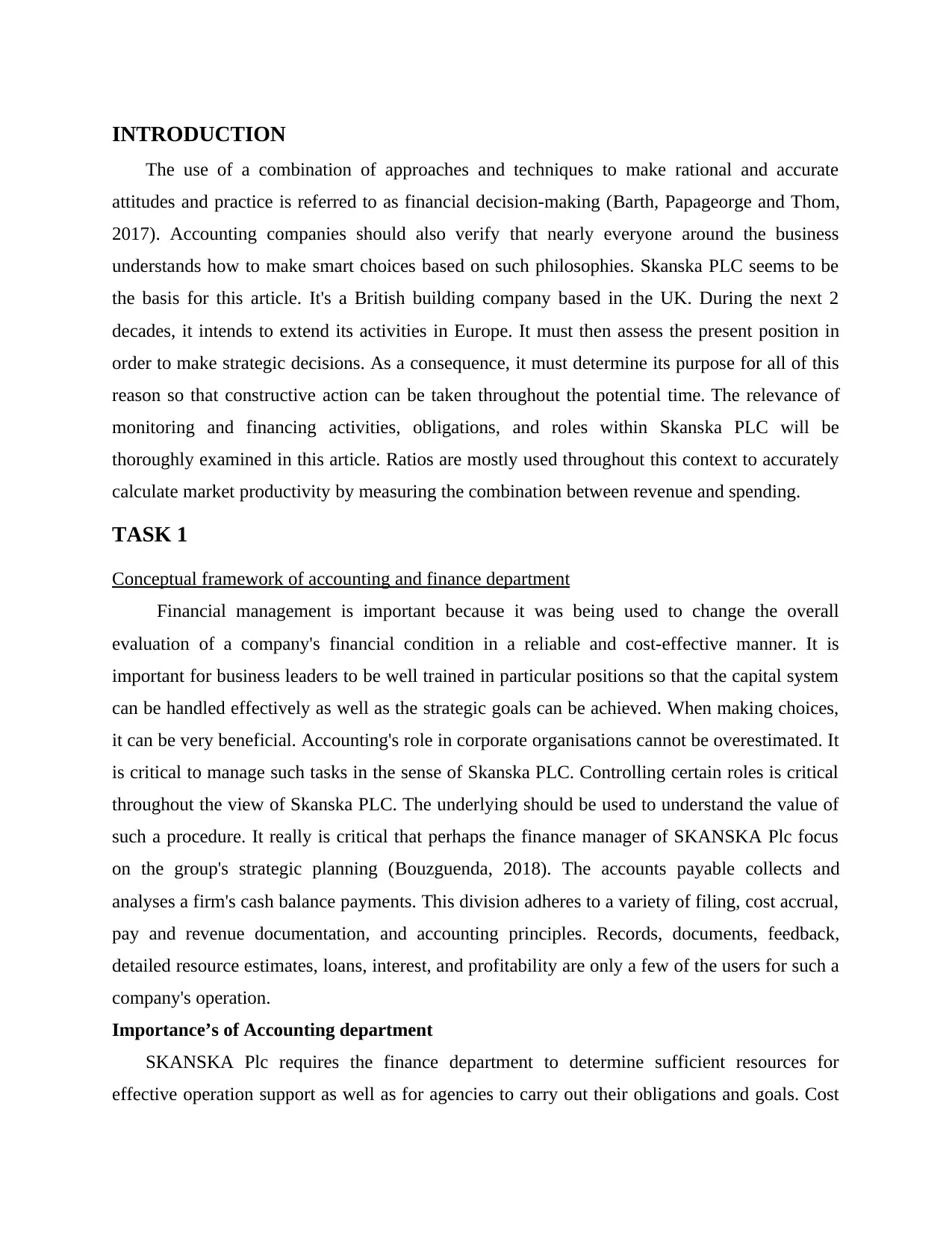
INTRODUCTION
The use of a combination of approaches and techniques to make rational and accurate
attitudes and practice is referred to as financial decision-making (Barth, Papageorge and Thom,
2017). Accounting companies should also verify that nearly everyone around the business
understands how to make smart choices based on such philosophies. Skanska PLC seems to be
the basis for this article. It's a British building company based in the UK. During the next 2
decades, it intends to extend its activities in Europe. It must then assess the present position in
order to make strategic decisions. As a consequence, it must determine its purpose for all of this
reason so that constructive action can be taken throughout the potential time. The relevance of
monitoring and financing activities, obligations, and roles within Skanska PLC will be
thoroughly examined in this article. Ratios are mostly used throughout this context to accurately
calculate market productivity by measuring the combination between revenue and spending.
TASK 1
Conceptual framework of accounting and finance department
Financial management is important because it was being used to change the overall
evaluation of a company's financial condition in a reliable and cost-effective manner. It is
important for business leaders to be well trained in particular positions so that the capital system
can be handled effectively as well as the strategic goals can be achieved. When making choices,
it can be very beneficial. Accounting's role in corporate organisations cannot be overestimated. It
is critical to manage such tasks in the sense of Skanska PLC. Controlling certain roles is critical
throughout the view of Skanska PLC. The underlying should be used to understand the value of
such a procedure. It really is critical that perhaps the finance manager of SKANSKA Plc focus
on the group's strategic planning (Bouzguenda, 2018). The accounts payable collects and
analyses a firm's cash balance payments. This division adheres to a variety of filing, cost accrual,
pay and revenue documentation, and accounting principles. Records, documents, feedback,
detailed resource estimates, loans, interest, and profitability are only a few of the users for such a
company's operation.
Importance’s of Accounting department
SKANSKA Plc requires the finance department to determine sufficient resources for
effective operation support as well as for agencies to carry out their obligations and goals. Cost
The use of a combination of approaches and techniques to make rational and accurate
attitudes and practice is referred to as financial decision-making (Barth, Papageorge and Thom,
2017). Accounting companies should also verify that nearly everyone around the business
understands how to make smart choices based on such philosophies. Skanska PLC seems to be
the basis for this article. It's a British building company based in the UK. During the next 2
decades, it intends to extend its activities in Europe. It must then assess the present position in
order to make strategic decisions. As a consequence, it must determine its purpose for all of this
reason so that constructive action can be taken throughout the potential time. The relevance of
monitoring and financing activities, obligations, and roles within Skanska PLC will be
thoroughly examined in this article. Ratios are mostly used throughout this context to accurately
calculate market productivity by measuring the combination between revenue and spending.
TASK 1
Conceptual framework of accounting and finance department
Financial management is important because it was being used to change the overall
evaluation of a company's financial condition in a reliable and cost-effective manner. It is
important for business leaders to be well trained in particular positions so that the capital system
can be handled effectively as well as the strategic goals can be achieved. When making choices,
it can be very beneficial. Accounting's role in corporate organisations cannot be overestimated. It
is critical to manage such tasks in the sense of Skanska PLC. Controlling certain roles is critical
throughout the view of Skanska PLC. The underlying should be used to understand the value of
such a procedure. It really is critical that perhaps the finance manager of SKANSKA Plc focus
on the group's strategic planning (Bouzguenda, 2018). The accounts payable collects and
analyses a firm's cash balance payments. This division adheres to a variety of filing, cost accrual,
pay and revenue documentation, and accounting principles. Records, documents, feedback,
detailed resource estimates, loans, interest, and profitability are only a few of the users for such a
company's operation.
Importance’s of Accounting department
SKANSKA Plc requires the finance department to determine sufficient resources for
effective operation support as well as for agencies to carry out their obligations and goals. Cost
⊘ This is a preview!⊘
Do you want full access?
Subscribe today to unlock all pages.

Trusted by 1+ million students worldwide
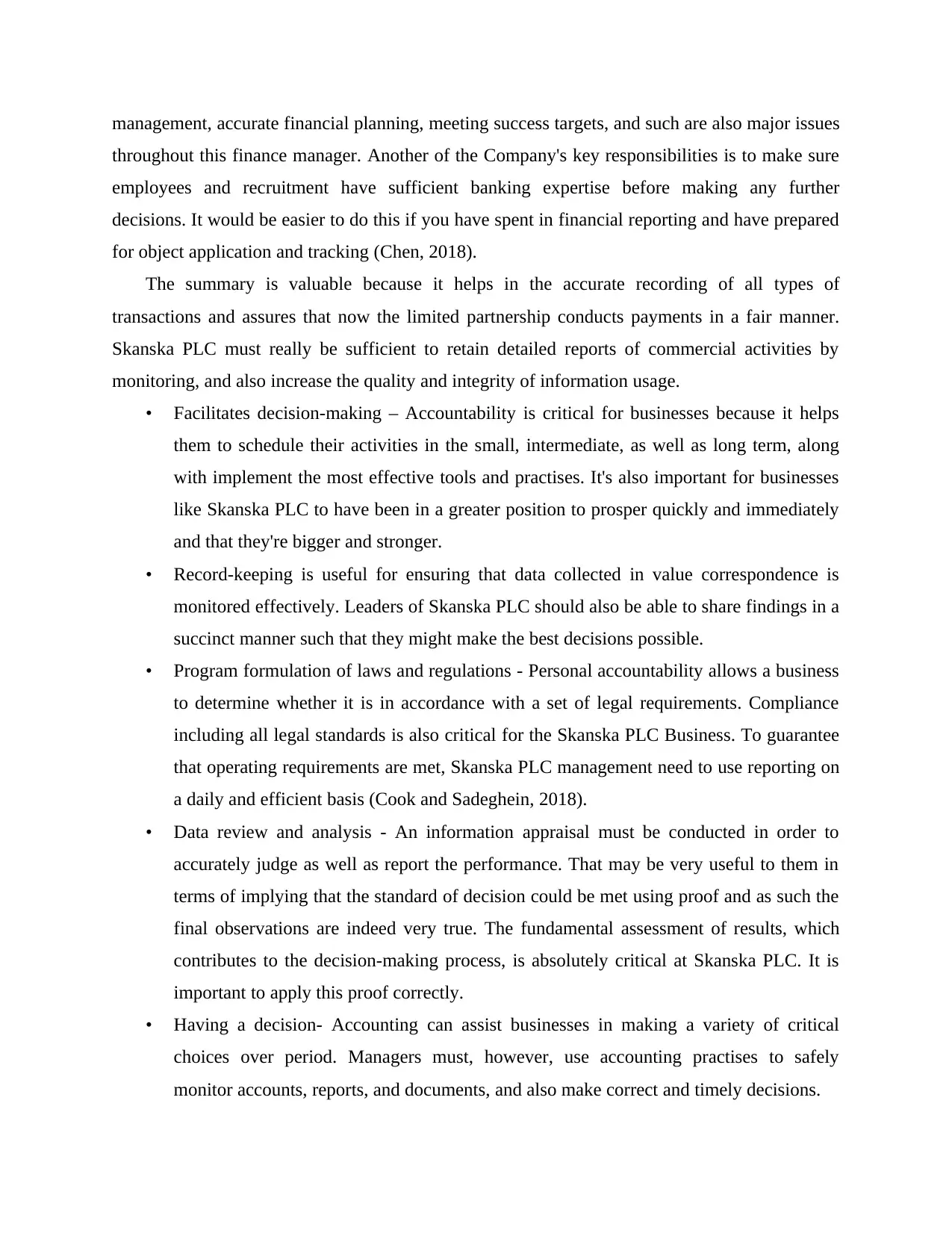
management, accurate financial planning, meeting success targets, and such are also major issues
throughout this finance manager. Another of the Company's key responsibilities is to make sure
employees and recruitment have sufficient banking expertise before making any further
decisions. It would be easier to do this if you have spent in financial reporting and have prepared
for object application and tracking (Chen, 2018).
The summary is valuable because it helps in the accurate recording of all types of
transactions and assures that now the limited partnership conducts payments in a fair manner.
Skanska PLC must really be sufficient to retain detailed reports of commercial activities by
monitoring, and also increase the quality and integrity of information usage.
• Facilitates decision-making – Accountability is critical for businesses because it helps
them to schedule their activities in the small, intermediate, as well as long term, along
with implement the most effective tools and practises. It's also important for businesses
like Skanska PLC to have been in a greater position to prosper quickly and immediately
and that they're bigger and stronger.
• Record-keeping is useful for ensuring that data collected in value correspondence is
monitored effectively. Leaders of Skanska PLC should also be able to share findings in a
succinct manner such that they might make the best decisions possible.
• Program formulation of laws and regulations - Personal accountability allows a business
to determine whether it is in accordance with a set of legal requirements. Compliance
including all legal standards is also critical for the Skanska PLC Business. To guarantee
that operating requirements are met, Skanska PLC management need to use reporting on
a daily and efficient basis (Cook and Sadeghein, 2018).
• Data review and analysis - An information appraisal must be conducted in order to
accurately judge as well as report the performance. That may be very useful to them in
terms of implying that the standard of decision could be met using proof and as such the
final observations are indeed very true. The fundamental assessment of results, which
contributes to the decision-making process, is absolutely critical at Skanska PLC. It is
important to apply this proof correctly.
• Having a decision- Accounting can assist businesses in making a variety of critical
choices over period. Managers must, however, use accounting practises to safely
monitor accounts, reports, and documents, and also make correct and timely decisions.
throughout this finance manager. Another of the Company's key responsibilities is to make sure
employees and recruitment have sufficient banking expertise before making any further
decisions. It would be easier to do this if you have spent in financial reporting and have prepared
for object application and tracking (Chen, 2018).
The summary is valuable because it helps in the accurate recording of all types of
transactions and assures that now the limited partnership conducts payments in a fair manner.
Skanska PLC must really be sufficient to retain detailed reports of commercial activities by
monitoring, and also increase the quality and integrity of information usage.
• Facilitates decision-making – Accountability is critical for businesses because it helps
them to schedule their activities in the small, intermediate, as well as long term, along
with implement the most effective tools and practises. It's also important for businesses
like Skanska PLC to have been in a greater position to prosper quickly and immediately
and that they're bigger and stronger.
• Record-keeping is useful for ensuring that data collected in value correspondence is
monitored effectively. Leaders of Skanska PLC should also be able to share findings in a
succinct manner such that they might make the best decisions possible.
• Program formulation of laws and regulations - Personal accountability allows a business
to determine whether it is in accordance with a set of legal requirements. Compliance
including all legal standards is also critical for the Skanska PLC Business. To guarantee
that operating requirements are met, Skanska PLC management need to use reporting on
a daily and efficient basis (Cook and Sadeghein, 2018).
• Data review and analysis - An information appraisal must be conducted in order to
accurately judge as well as report the performance. That may be very useful to them in
terms of implying that the standard of decision could be met using proof and as such the
final observations are indeed very true. The fundamental assessment of results, which
contributes to the decision-making process, is absolutely critical at Skanska PLC. It is
important to apply this proof correctly.
• Having a decision- Accounting can assist businesses in making a variety of critical
choices over period. Managers must, however, use accounting practises to safely
monitor accounts, reports, and documents, and also make correct and timely decisions.
Paraphrase This Document
Need a fresh take? Get an instant paraphrase of this document with our AI Paraphraser
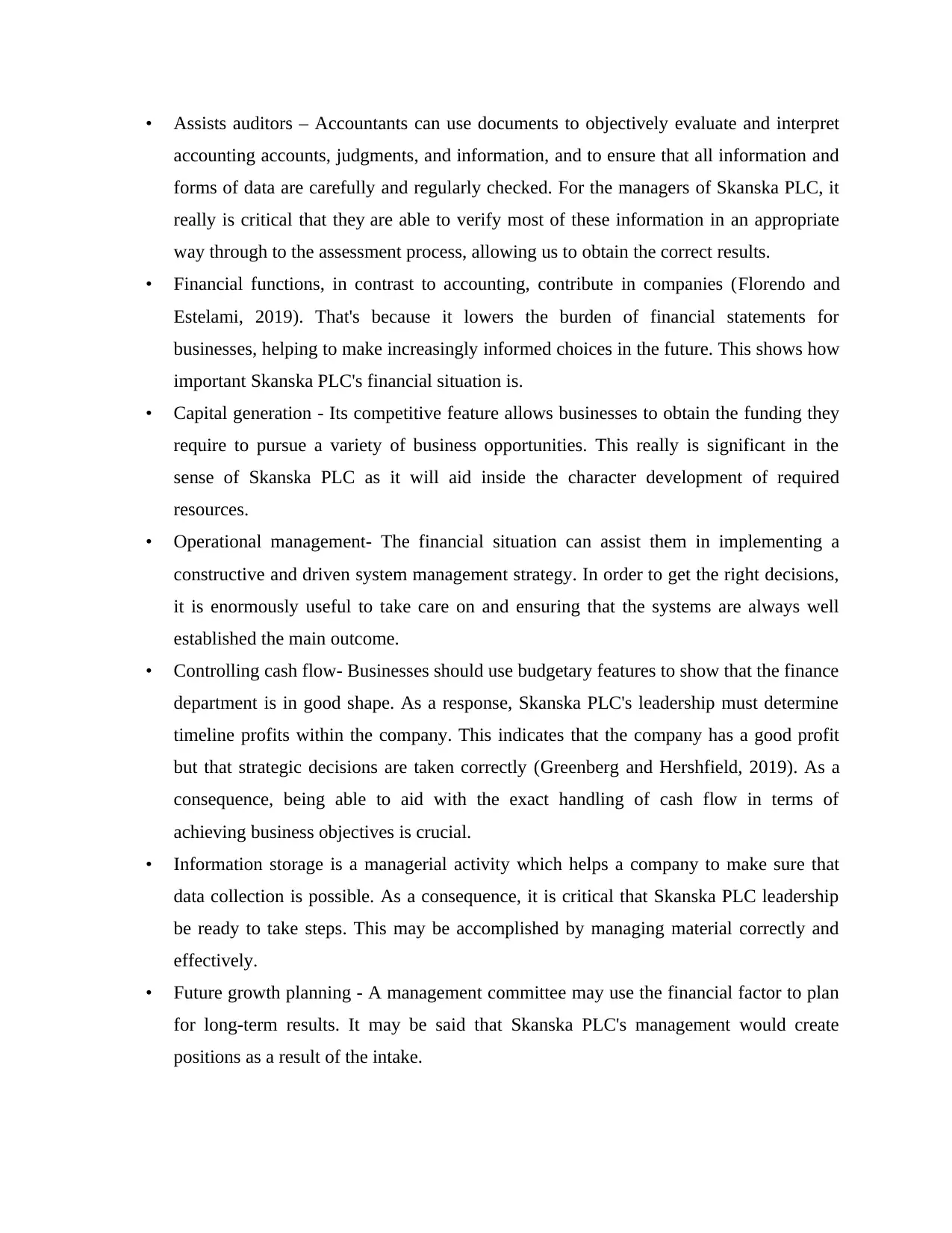
• Assists auditors – Accountants can use documents to objectively evaluate and interpret
accounting accounts, judgments, and information, and to ensure that all information and
forms of data are carefully and regularly checked. For the managers of Skanska PLC, it
really is critical that they are able to verify most of these information in an appropriate
way through to the assessment process, allowing us to obtain the correct results.
• Financial functions, in contrast to accounting, contribute in companies (Florendo and
Estelami, 2019). That's because it lowers the burden of financial statements for
businesses, helping to make increasingly informed choices in the future. This shows how
important Skanska PLC's financial situation is.
• Capital generation - Its competitive feature allows businesses to obtain the funding they
require to pursue a variety of business opportunities. This really is significant in the
sense of Skanska PLC as it will aid inside the character development of required
resources.
• Operational management- The financial situation can assist them in implementing a
constructive and driven system management strategy. In order to get the right decisions,
it is enormously useful to take care on and ensuring that the systems are always well
established the main outcome.
• Controlling cash flow- Businesses should use budgetary features to show that the finance
department is in good shape. As a response, Skanska PLC's leadership must determine
timeline profits within the company. This indicates that the company has a good profit
but that strategic decisions are taken correctly (Greenberg and Hershfield, 2019). As a
consequence, being able to aid with the exact handling of cash flow in terms of
achieving business objectives is crucial.
• Information storage is a managerial activity which helps a company to make sure that
data collection is possible. As a consequence, it is critical that Skanska PLC leadership
be ready to take steps. This may be accomplished by managing material correctly and
effectively.
• Future growth planning - A management committee may use the financial factor to plan
for long-term results. It may be said that Skanska PLC's management would create
positions as a result of the intake.
accounting accounts, judgments, and information, and to ensure that all information and
forms of data are carefully and regularly checked. For the managers of Skanska PLC, it
really is critical that they are able to verify most of these information in an appropriate
way through to the assessment process, allowing us to obtain the correct results.
• Financial functions, in contrast to accounting, contribute in companies (Florendo and
Estelami, 2019). That's because it lowers the burden of financial statements for
businesses, helping to make increasingly informed choices in the future. This shows how
important Skanska PLC's financial situation is.
• Capital generation - Its competitive feature allows businesses to obtain the funding they
require to pursue a variety of business opportunities. This really is significant in the
sense of Skanska PLC as it will aid inside the character development of required
resources.
• Operational management- The financial situation can assist them in implementing a
constructive and driven system management strategy. In order to get the right decisions,
it is enormously useful to take care on and ensuring that the systems are always well
established the main outcome.
• Controlling cash flow- Businesses should use budgetary features to show that the finance
department is in good shape. As a response, Skanska PLC's leadership must determine
timeline profits within the company. This indicates that the company has a good profit
but that strategic decisions are taken correctly (Greenberg and Hershfield, 2019). As a
consequence, being able to aid with the exact handling of cash flow in terms of
achieving business objectives is crucial.
• Information storage is a managerial activity which helps a company to make sure that
data collection is possible. As a consequence, it is critical that Skanska PLC leadership
be ready to take steps. This may be accomplished by managing material correctly and
effectively.
• Future growth planning - A management committee may use the financial factor to plan
for long-term results. It may be said that Skanska PLC's management would create
positions as a result of the intake.
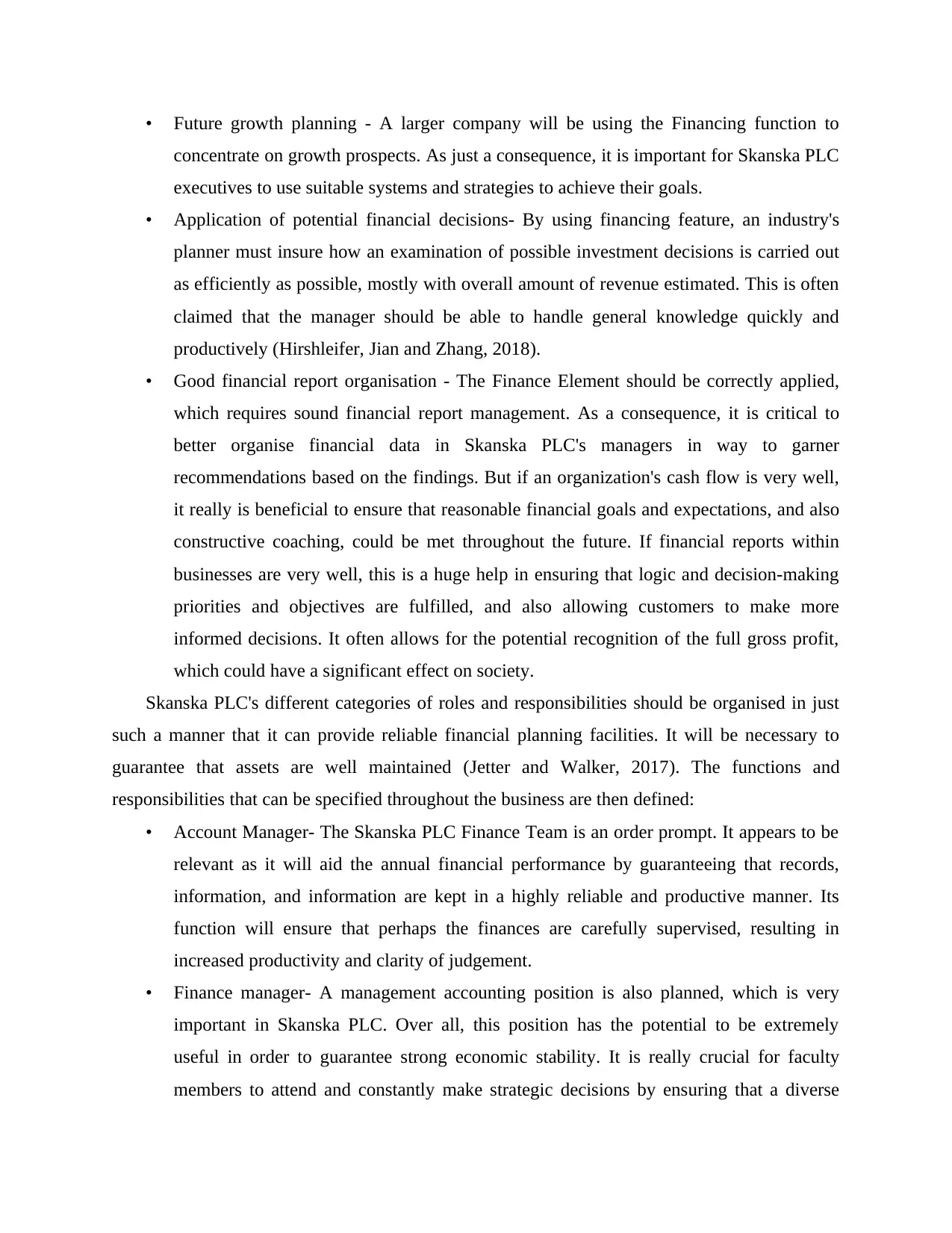
• Future growth planning - A larger company will be using the Financing function to
concentrate on growth prospects. As just a consequence, it is important for Skanska PLC
executives to use suitable systems and strategies to achieve their goals.
• Application of potential financial decisions- By using financing feature, an industry's
planner must insure how an examination of possible investment decisions is carried out
as efficiently as possible, mostly with overall amount of revenue estimated. This is often
claimed that the manager should be able to handle general knowledge quickly and
productively (Hirshleifer, Jian and Zhang, 2018).
• Good financial report organisation - The Finance Element should be correctly applied,
which requires sound financial report management. As a consequence, it is critical to
better organise financial data in Skanska PLC's managers in way to garner
recommendations based on the findings. But if an organization's cash flow is very well,
it really is beneficial to ensure that reasonable financial goals and expectations, and also
constructive coaching, could be met throughout the future. If financial reports within
businesses are very well, this is a huge help in ensuring that logic and decision-making
priorities and objectives are fulfilled, and also allowing customers to make more
informed decisions. It often allows for the potential recognition of the full gross profit,
which could have a significant effect on society.
Skanska PLC's different categories of roles and responsibilities should be organised in just
such a manner that it can provide reliable financial planning facilities. It will be necessary to
guarantee that assets are well maintained (Jetter and Walker, 2017). The functions and
responsibilities that can be specified throughout the business are then defined:
• Account Manager- The Skanska PLC Finance Team is an order prompt. It appears to be
relevant as it will aid the annual financial performance by guaranteeing that records,
information, and information are kept in a highly reliable and productive manner. Its
function will ensure that perhaps the finances are carefully supervised, resulting in
increased productivity and clarity of judgement.
• Finance manager- A management accounting position is also planned, which is very
important in Skanska PLC. Over all, this position has the potential to be extremely
useful in order to guarantee strong economic stability. It is really crucial for faculty
members to attend and constantly make strategic decisions by ensuring that a diverse
concentrate on growth prospects. As just a consequence, it is important for Skanska PLC
executives to use suitable systems and strategies to achieve their goals.
• Application of potential financial decisions- By using financing feature, an industry's
planner must insure how an examination of possible investment decisions is carried out
as efficiently as possible, mostly with overall amount of revenue estimated. This is often
claimed that the manager should be able to handle general knowledge quickly and
productively (Hirshleifer, Jian and Zhang, 2018).
• Good financial report organisation - The Finance Element should be correctly applied,
which requires sound financial report management. As a consequence, it is critical to
better organise financial data in Skanska PLC's managers in way to garner
recommendations based on the findings. But if an organization's cash flow is very well,
it really is beneficial to ensure that reasonable financial goals and expectations, and also
constructive coaching, could be met throughout the future. If financial reports within
businesses are very well, this is a huge help in ensuring that logic and decision-making
priorities and objectives are fulfilled, and also allowing customers to make more
informed decisions. It often allows for the potential recognition of the full gross profit,
which could have a significant effect on society.
Skanska PLC's different categories of roles and responsibilities should be organised in just
such a manner that it can provide reliable financial planning facilities. It will be necessary to
guarantee that assets are well maintained (Jetter and Walker, 2017). The functions and
responsibilities that can be specified throughout the business are then defined:
• Account Manager- The Skanska PLC Finance Team is an order prompt. It appears to be
relevant as it will aid the annual financial performance by guaranteeing that records,
information, and information are kept in a highly reliable and productive manner. Its
function will ensure that perhaps the finances are carefully supervised, resulting in
increased productivity and clarity of judgement.
• Finance manager- A management accounting position is also planned, which is very
important in Skanska PLC. Over all, this position has the potential to be extremely
useful in order to guarantee strong economic stability. It is really crucial for faculty
members to attend and constantly make strategic decisions by ensuring that a diverse
⊘ This is a preview!⊘
Do you want full access?
Subscribe today to unlock all pages.

Trusted by 1+ million students worldwide
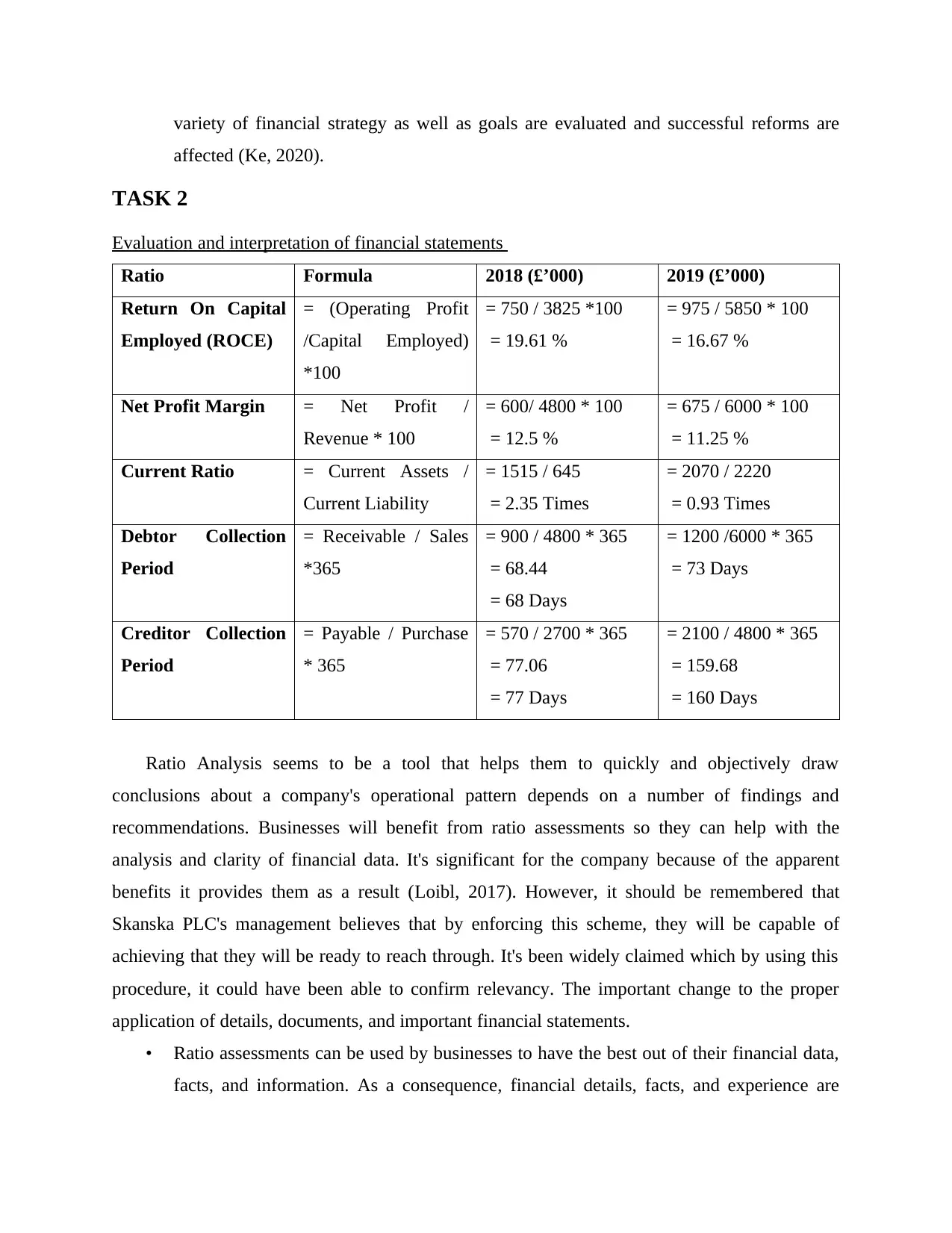
variety of financial strategy as well as goals are evaluated and successful reforms are
affected (Ke, 2020).
TASK 2
Evaluation and interpretation of financial statements
Ratio Formula 2018 (£’000) 2019 (£’000)
Return On Capital
Employed (ROCE)
= (Operating Profit
/Capital Employed)
*100
= 750 / 3825 *100
= 19.61 %
= 975 / 5850 * 100
= 16.67 %
Net Profit Margin = Net Profit /
Revenue * 100
= 600/ 4800 * 100
= 12.5 %
= 675 / 6000 * 100
= 11.25 %
Current Ratio = Current Assets /
Current Liability
= 1515 / 645
= 2.35 Times
= 2070 / 2220
= 0.93 Times
Debtor Collection
Period
= Receivable / Sales
*365
= 900 / 4800 * 365
= 68.44
= 68 Days
= 1200 /6000 * 365
= 73 Days
Creditor Collection
Period
= Payable / Purchase
* 365
= 570 / 2700 * 365
= 77.06
= 77 Days
= 2100 / 4800 * 365
= 159.68
= 160 Days
Ratio Analysis seems to be a tool that helps them to quickly and objectively draw
conclusions about a company's operational pattern depends on a number of findings and
recommendations. Businesses will benefit from ratio assessments so they can help with the
analysis and clarity of financial data. It's significant for the company because of the apparent
benefits it provides them as a result (Loibl, 2017). However, it should be remembered that
Skanska PLC's management believes that by enforcing this scheme, they will be capable of
achieving that they will be ready to reach through. It's been widely claimed which by using this
procedure, it could have been able to confirm relevancy. The important change to the proper
application of details, documents, and important financial statements.
• Ratio assessments can be used by businesses to have the best out of their financial data,
facts, and information. As a consequence, financial details, facts, and experience are
affected (Ke, 2020).
TASK 2
Evaluation and interpretation of financial statements
Ratio Formula 2018 (£’000) 2019 (£’000)
Return On Capital
Employed (ROCE)
= (Operating Profit
/Capital Employed)
*100
= 750 / 3825 *100
= 19.61 %
= 975 / 5850 * 100
= 16.67 %
Net Profit Margin = Net Profit /
Revenue * 100
= 600/ 4800 * 100
= 12.5 %
= 675 / 6000 * 100
= 11.25 %
Current Ratio = Current Assets /
Current Liability
= 1515 / 645
= 2.35 Times
= 2070 / 2220
= 0.93 Times
Debtor Collection
Period
= Receivable / Sales
*365
= 900 / 4800 * 365
= 68.44
= 68 Days
= 1200 /6000 * 365
= 73 Days
Creditor Collection
Period
= Payable / Purchase
* 365
= 570 / 2700 * 365
= 77.06
= 77 Days
= 2100 / 4800 * 365
= 159.68
= 160 Days
Ratio Analysis seems to be a tool that helps them to quickly and objectively draw
conclusions about a company's operational pattern depends on a number of findings and
recommendations. Businesses will benefit from ratio assessments so they can help with the
analysis and clarity of financial data. It's significant for the company because of the apparent
benefits it provides them as a result (Loibl, 2017). However, it should be remembered that
Skanska PLC's management believes that by enforcing this scheme, they will be capable of
achieving that they will be ready to reach through. It's been widely claimed which by using this
procedure, it could have been able to confirm relevancy. The important change to the proper
application of details, documents, and important financial statements.
• Ratio assessments can be used by businesses to have the best out of their financial data,
facts, and information. As a consequence, financial details, facts, and experience are
Paraphrase This Document
Need a fresh take? Get an instant paraphrase of this document with our AI Paraphraser
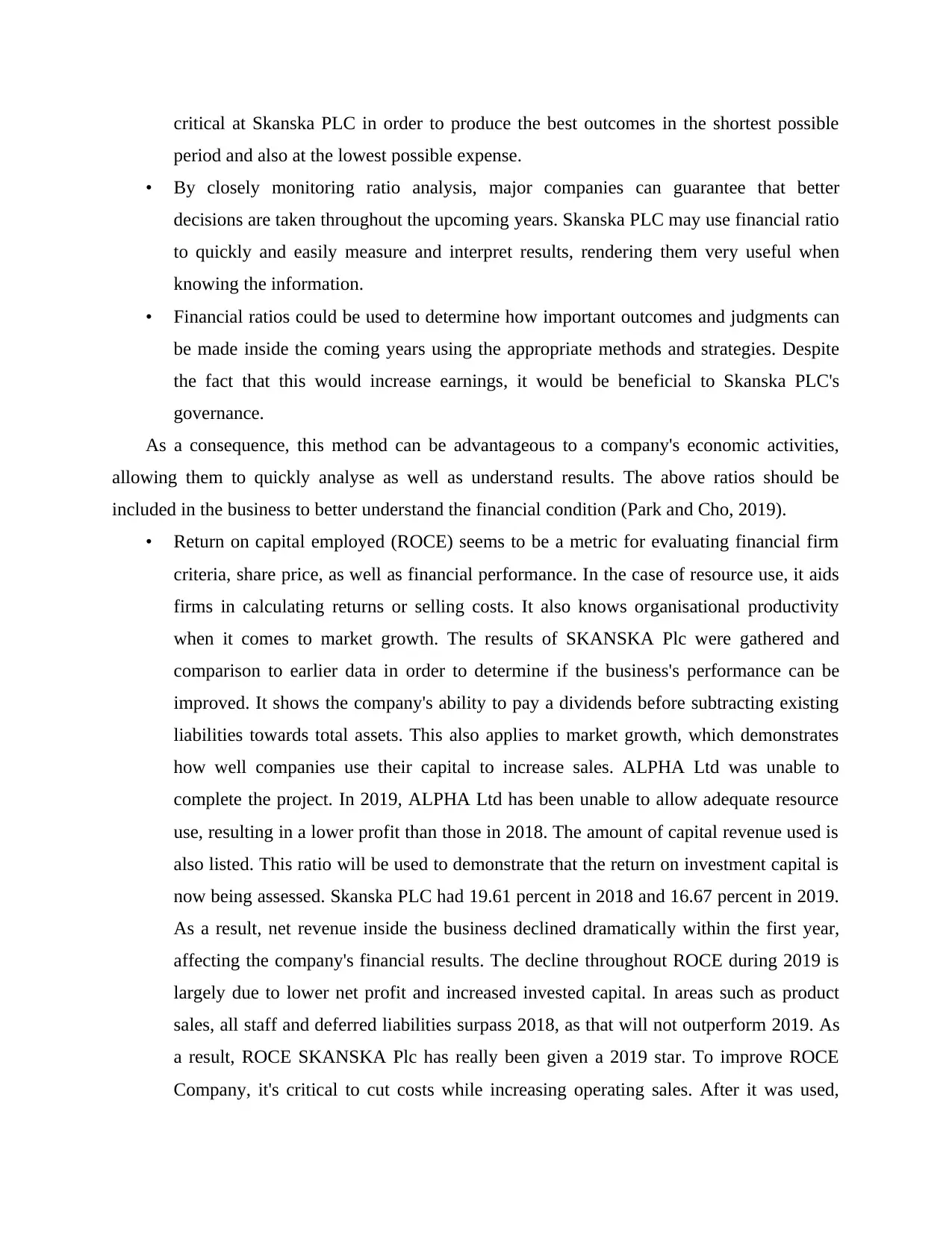
critical at Skanska PLC in order to produce the best outcomes in the shortest possible
period and also at the lowest possible expense.
• By closely monitoring ratio analysis, major companies can guarantee that better
decisions are taken throughout the upcoming years. Skanska PLC may use financial ratio
to quickly and easily measure and interpret results, rendering them very useful when
knowing the information.
• Financial ratios could be used to determine how important outcomes and judgments can
be made inside the coming years using the appropriate methods and strategies. Despite
the fact that this would increase earnings, it would be beneficial to Skanska PLC's
governance.
As a consequence, this method can be advantageous to a company's economic activities,
allowing them to quickly analyse as well as understand results. The above ratios should be
included in the business to better understand the financial condition (Park and Cho, 2019).
• Return on capital employed (ROCE) seems to be a metric for evaluating financial firm
criteria, share price, as well as financial performance. In the case of resource use, it aids
firms in calculating returns or selling costs. It also knows organisational productivity
when it comes to market growth. The results of SKANSKA Plc were gathered and
comparison to earlier data in order to determine if the business's performance can be
improved. It shows the company's ability to pay a dividends before subtracting existing
liabilities towards total assets. This also applies to market growth, which demonstrates
how well companies use their capital to increase sales. ALPHA Ltd was unable to
complete the project. In 2019, ALPHA Ltd has been unable to allow adequate resource
use, resulting in a lower profit than those in 2018. The amount of capital revenue used is
also listed. This ratio will be used to demonstrate that the return on investment capital is
now being assessed. Skanska PLC had 19.61 percent in 2018 and 16.67 percent in 2019.
As a result, net revenue inside the business declined dramatically within the first year,
affecting the company's financial results. The decline throughout ROCE during 2019 is
largely due to lower net profit and increased invested capital. In areas such as product
sales, all staff and deferred liabilities surpass 2018, as that will not outperform 2019. As
a result, ROCE SKANSKA Plc has really been given a 2019 star. To improve ROCE
Company, it's critical to cut costs while increasing operating sales. After it was used,
period and also at the lowest possible expense.
• By closely monitoring ratio analysis, major companies can guarantee that better
decisions are taken throughout the upcoming years. Skanska PLC may use financial ratio
to quickly and easily measure and interpret results, rendering them very useful when
knowing the information.
• Financial ratios could be used to determine how important outcomes and judgments can
be made inside the coming years using the appropriate methods and strategies. Despite
the fact that this would increase earnings, it would be beneficial to Skanska PLC's
governance.
As a consequence, this method can be advantageous to a company's economic activities,
allowing them to quickly analyse as well as understand results. The above ratios should be
included in the business to better understand the financial condition (Park and Cho, 2019).
• Return on capital employed (ROCE) seems to be a metric for evaluating financial firm
criteria, share price, as well as financial performance. In the case of resource use, it aids
firms in calculating returns or selling costs. It also knows organisational productivity
when it comes to market growth. The results of SKANSKA Plc were gathered and
comparison to earlier data in order to determine if the business's performance can be
improved. It shows the company's ability to pay a dividends before subtracting existing
liabilities towards total assets. This also applies to market growth, which demonstrates
how well companies use their capital to increase sales. ALPHA Ltd was unable to
complete the project. In 2019, ALPHA Ltd has been unable to allow adequate resource
use, resulting in a lower profit than those in 2018. The amount of capital revenue used is
also listed. This ratio will be used to demonstrate that the return on investment capital is
now being assessed. Skanska PLC had 19.61 percent in 2018 and 16.67 percent in 2019.
As a result, net revenue inside the business declined dramatically within the first year,
affecting the company's financial results. The decline throughout ROCE during 2019 is
largely due to lower net profit and increased invested capital. In areas such as product
sales, all staff and deferred liabilities surpass 2018, as that will not outperform 2019. As
a result, ROCE SKANSKA Plc has really been given a 2019 star. To improve ROCE
Company, it's critical to cut costs while increasing operating sales. After it was used,
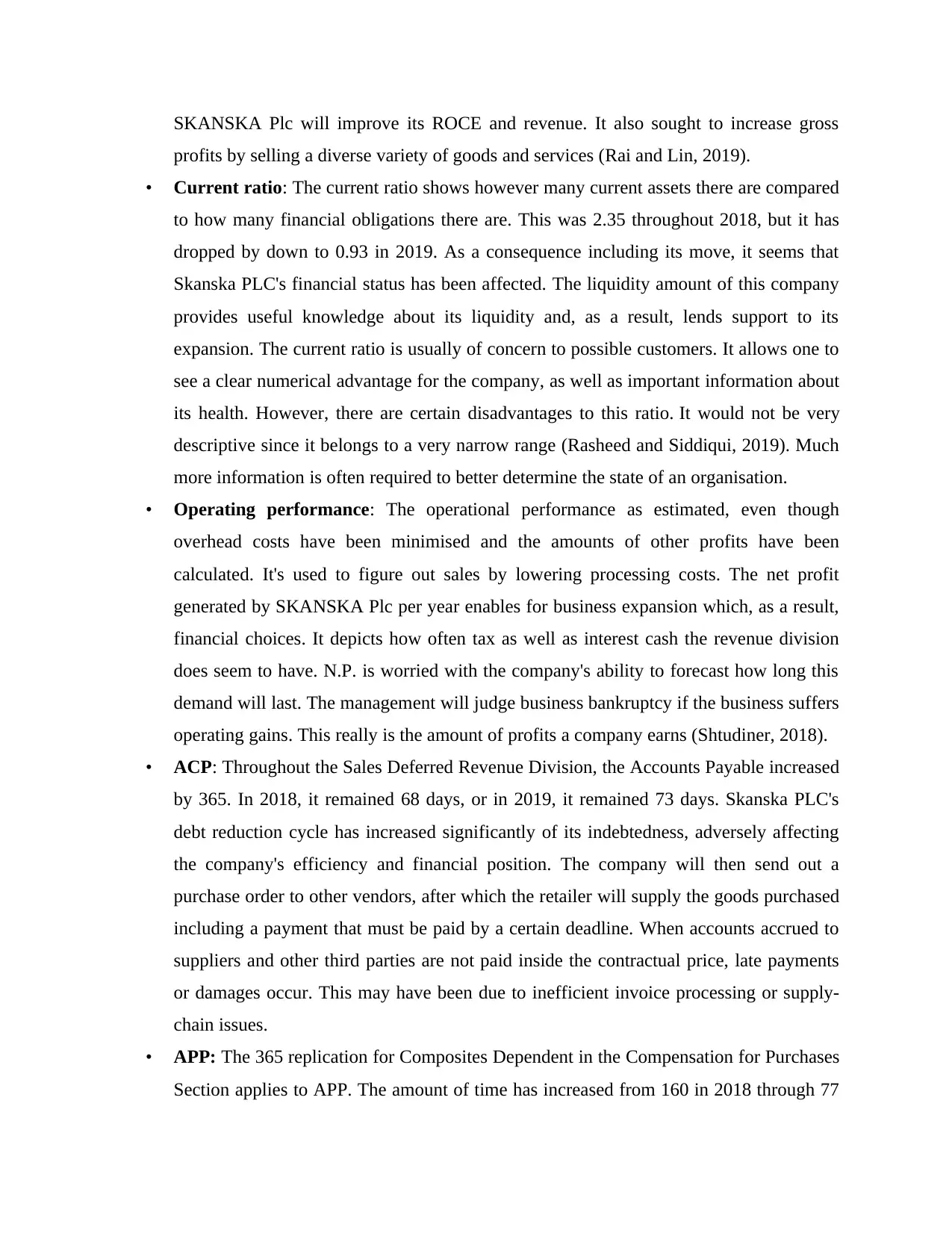
SKANSKA Plc will improve its ROCE and revenue. It also sought to increase gross
profits by selling a diverse variety of goods and services (Rai and Lin, 2019).
• Current ratio: The current ratio shows however many current assets there are compared
to how many financial obligations there are. This was 2.35 throughout 2018, but it has
dropped by down to 0.93 in 2019. As a consequence including its move, it seems that
Skanska PLC's financial status has been affected. The liquidity amount of this company
provides useful knowledge about its liquidity and, as a result, lends support to its
expansion. The current ratio is usually of concern to possible customers. It allows one to
see a clear numerical advantage for the company, as well as important information about
its health. However, there are certain disadvantages to this ratio. It would not be very
descriptive since it belongs to a very narrow range (Rasheed and Siddiqui, 2019). Much
more information is often required to better determine the state of an organisation.
• Operating performance: The operational performance as estimated, even though
overhead costs have been minimised and the amounts of other profits have been
calculated. It's used to figure out sales by lowering processing costs. The net profit
generated by SKANSKA Plc per year enables for business expansion which, as a result,
financial choices. It depicts how often tax as well as interest cash the revenue division
does seem to have. N.P. is worried with the company's ability to forecast how long this
demand will last. The management will judge business bankruptcy if the business suffers
operating gains. This really is the amount of profits a company earns (Shtudiner, 2018).
• ACP: Throughout the Sales Deferred Revenue Division, the Accounts Payable increased
by 365. In 2018, it remained 68 days, or in 2019, it remained 73 days. Skanska PLC's
debt reduction cycle has increased significantly of its indebtedness, adversely affecting
the company's efficiency and financial position. The company will then send out a
purchase order to other vendors, after which the retailer will supply the goods purchased
including a payment that must be paid by a certain deadline. When accounts accrued to
suppliers and other third parties are not paid inside the contractual price, late payments
or damages occur. This may have been due to inefficient invoice processing or supply-
chain issues.
• APP: The 365 replication for Composites Dependent in the Compensation for Purchases
Section applies to APP. The amount of time has increased from 160 in 2018 through 77
profits by selling a diverse variety of goods and services (Rai and Lin, 2019).
• Current ratio: The current ratio shows however many current assets there are compared
to how many financial obligations there are. This was 2.35 throughout 2018, but it has
dropped by down to 0.93 in 2019. As a consequence including its move, it seems that
Skanska PLC's financial status has been affected. The liquidity amount of this company
provides useful knowledge about its liquidity and, as a result, lends support to its
expansion. The current ratio is usually of concern to possible customers. It allows one to
see a clear numerical advantage for the company, as well as important information about
its health. However, there are certain disadvantages to this ratio. It would not be very
descriptive since it belongs to a very narrow range (Rasheed and Siddiqui, 2019). Much
more information is often required to better determine the state of an organisation.
• Operating performance: The operational performance as estimated, even though
overhead costs have been minimised and the amounts of other profits have been
calculated. It's used to figure out sales by lowering processing costs. The net profit
generated by SKANSKA Plc per year enables for business expansion which, as a result,
financial choices. It depicts how often tax as well as interest cash the revenue division
does seem to have. N.P. is worried with the company's ability to forecast how long this
demand will last. The management will judge business bankruptcy if the business suffers
operating gains. This really is the amount of profits a company earns (Shtudiner, 2018).
• ACP: Throughout the Sales Deferred Revenue Division, the Accounts Payable increased
by 365. In 2018, it remained 68 days, or in 2019, it remained 73 days. Skanska PLC's
debt reduction cycle has increased significantly of its indebtedness, adversely affecting
the company's efficiency and financial position. The company will then send out a
purchase order to other vendors, after which the retailer will supply the goods purchased
including a payment that must be paid by a certain deadline. When accounts accrued to
suppliers and other third parties are not paid inside the contractual price, late payments
or damages occur. This may have been due to inefficient invoice processing or supply-
chain issues.
• APP: The 365 replication for Composites Dependent in the Compensation for Purchases
Section applies to APP. The amount of time has increased from 160 in 2018 through 77
⊘ This is a preview!⊘
Do you want full access?
Subscribe today to unlock all pages.

Trusted by 1+ million students worldwide
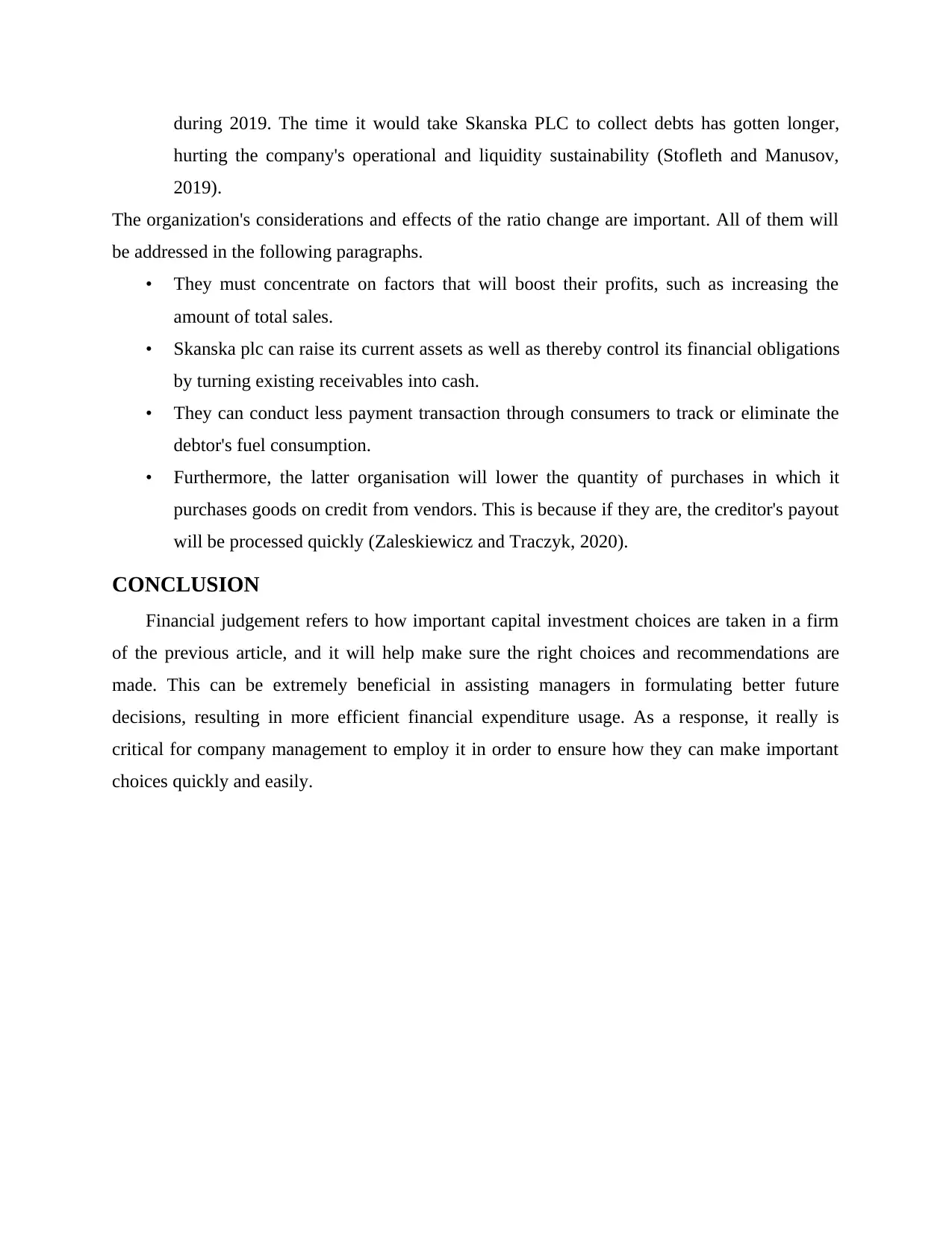
during 2019. The time it would take Skanska PLC to collect debts has gotten longer,
hurting the company's operational and liquidity sustainability (Stofleth and Manusov,
2019).
The organization's considerations and effects of the ratio change are important. All of them will
be addressed in the following paragraphs.
• They must concentrate on factors that will boost their profits, such as increasing the
amount of total sales.
• Skanska plc can raise its current assets as well as thereby control its financial obligations
by turning existing receivables into cash.
• They can conduct less payment transaction through consumers to track or eliminate the
debtor's fuel consumption.
• Furthermore, the latter organisation will lower the quantity of purchases in which it
purchases goods on credit from vendors. This is because if they are, the creditor's payout
will be processed quickly (Zaleskiewicz and Traczyk, 2020).
CONCLUSION
Financial judgement refers to how important capital investment choices are taken in a firm
of the previous article, and it will help make sure the right choices and recommendations are
made. This can be extremely beneficial in assisting managers in formulating better future
decisions, resulting in more efficient financial expenditure usage. As a response, it really is
critical for company management to employ it in order to ensure how they can make important
choices quickly and easily.
hurting the company's operational and liquidity sustainability (Stofleth and Manusov,
2019).
The organization's considerations and effects of the ratio change are important. All of them will
be addressed in the following paragraphs.
• They must concentrate on factors that will boost their profits, such as increasing the
amount of total sales.
• Skanska plc can raise its current assets as well as thereby control its financial obligations
by turning existing receivables into cash.
• They can conduct less payment transaction through consumers to track or eliminate the
debtor's fuel consumption.
• Furthermore, the latter organisation will lower the quantity of purchases in which it
purchases goods on credit from vendors. This is because if they are, the creditor's payout
will be processed quickly (Zaleskiewicz and Traczyk, 2020).
CONCLUSION
Financial judgement refers to how important capital investment choices are taken in a firm
of the previous article, and it will help make sure the right choices and recommendations are
made. This can be extremely beneficial in assisting managers in formulating better future
decisions, resulting in more efficient financial expenditure usage. As a response, it really is
critical for company management to employ it in order to ensure how they can make important
choices quickly and easily.
Paraphrase This Document
Need a fresh take? Get an instant paraphrase of this document with our AI Paraphraser
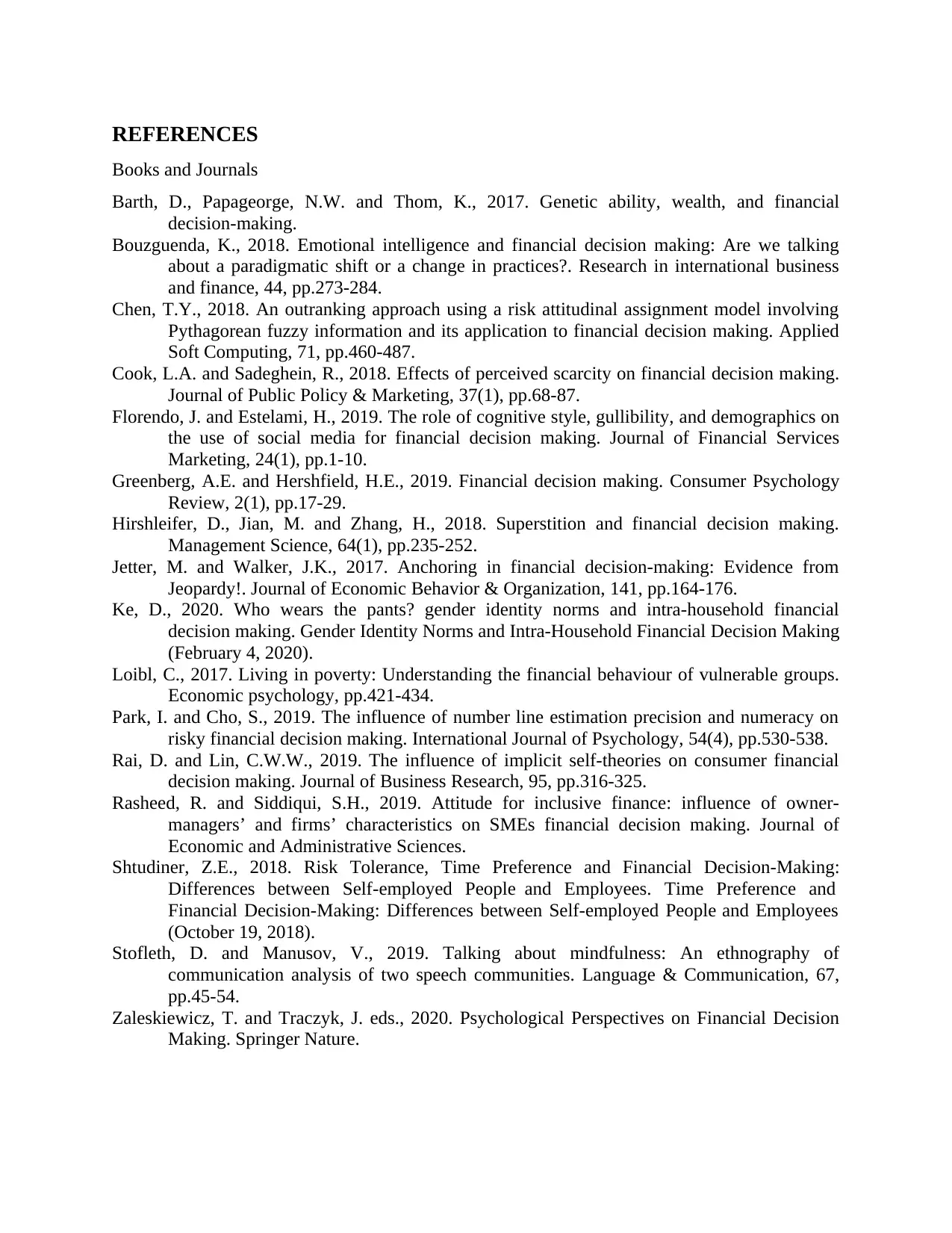
REFERENCES
Books and Journals
Barth, D., Papageorge, N.W. and Thom, K., 2017. Genetic ability, wealth, and financial
decision-making.
Bouzguenda, K., 2018. Emotional intelligence and financial decision making: Are we talking
about a paradigmatic shift or a change in practices?. Research in international business
and finance, 44, pp.273-284.
Chen, T.Y., 2018. An outranking approach using a risk attitudinal assignment model involving
Pythagorean fuzzy information and its application to financial decision making. Applied
Soft Computing, 71, pp.460-487.
Cook, L.A. and Sadeghein, R., 2018. Effects of perceived scarcity on financial decision making.
Journal of Public Policy & Marketing, 37(1), pp.68-87.
Florendo, J. and Estelami, H., 2019. The role of cognitive style, gullibility, and demographics on
the use of social media for financial decision making. Journal of Financial Services
Marketing, 24(1), pp.1-10.
Greenberg, A.E. and Hershfield, H.E., 2019. Financial decision making. Consumer Psychology
Review, 2(1), pp.17-29.
Hirshleifer, D., Jian, M. and Zhang, H., 2018. Superstition and financial decision making.
Management Science, 64(1), pp.235-252.
Jetter, M. and Walker, J.K., 2017. Anchoring in financial decision-making: Evidence from
Jeopardy!. Journal of Economic Behavior & Organization, 141, pp.164-176.
Ke, D., 2020. Who wears the pants? gender identity norms and intra-household financial
decision making. Gender Identity Norms and Intra-Household Financial Decision Making
(February 4, 2020).
Loibl, C., 2017. Living in poverty: Understanding the financial behaviour of vulnerable groups.
Economic psychology, pp.421-434.
Park, I. and Cho, S., 2019. The influence of number line estimation precision and numeracy on
risky financial decision making. International Journal of Psychology, 54(4), pp.530-538.
Rai, D. and Lin, C.W.W., 2019. The influence of implicit self-theories on consumer financial
decision making. Journal of Business Research, 95, pp.316-325.
Rasheed, R. and Siddiqui, S.H., 2019. Attitude for inclusive finance: influence of owner-
managers’ and firms’ characteristics on SMEs financial decision making. Journal of
Economic and Administrative Sciences.
Shtudiner, Z.E., 2018. Risk Tolerance, Time Preference and Financial Decision-Making:
Differences between Self-employed People and Employees. Time Preference and
Financial Decision-Making: Differences between Self-employed People and Employees
(October 19, 2018).
Stofleth, D. and Manusov, V., 2019. Talking about mindfulness: An ethnography of
communication analysis of two speech communities. Language & Communication, 67,
pp.45-54.
Zaleskiewicz, T. and Traczyk, J. eds., 2020. Psychological Perspectives on Financial Decision
Making. Springer Nature.
Books and Journals
Barth, D., Papageorge, N.W. and Thom, K., 2017. Genetic ability, wealth, and financial
decision-making.
Bouzguenda, K., 2018. Emotional intelligence and financial decision making: Are we talking
about a paradigmatic shift or a change in practices?. Research in international business
and finance, 44, pp.273-284.
Chen, T.Y., 2018. An outranking approach using a risk attitudinal assignment model involving
Pythagorean fuzzy information and its application to financial decision making. Applied
Soft Computing, 71, pp.460-487.
Cook, L.A. and Sadeghein, R., 2018. Effects of perceived scarcity on financial decision making.
Journal of Public Policy & Marketing, 37(1), pp.68-87.
Florendo, J. and Estelami, H., 2019. The role of cognitive style, gullibility, and demographics on
the use of social media for financial decision making. Journal of Financial Services
Marketing, 24(1), pp.1-10.
Greenberg, A.E. and Hershfield, H.E., 2019. Financial decision making. Consumer Psychology
Review, 2(1), pp.17-29.
Hirshleifer, D., Jian, M. and Zhang, H., 2018. Superstition and financial decision making.
Management Science, 64(1), pp.235-252.
Jetter, M. and Walker, J.K., 2017. Anchoring in financial decision-making: Evidence from
Jeopardy!. Journal of Economic Behavior & Organization, 141, pp.164-176.
Ke, D., 2020. Who wears the pants? gender identity norms and intra-household financial
decision making. Gender Identity Norms and Intra-Household Financial Decision Making
(February 4, 2020).
Loibl, C., 2017. Living in poverty: Understanding the financial behaviour of vulnerable groups.
Economic psychology, pp.421-434.
Park, I. and Cho, S., 2019. The influence of number line estimation precision and numeracy on
risky financial decision making. International Journal of Psychology, 54(4), pp.530-538.
Rai, D. and Lin, C.W.W., 2019. The influence of implicit self-theories on consumer financial
decision making. Journal of Business Research, 95, pp.316-325.
Rasheed, R. and Siddiqui, S.H., 2019. Attitude for inclusive finance: influence of owner-
managers’ and firms’ characteristics on SMEs financial decision making. Journal of
Economic and Administrative Sciences.
Shtudiner, Z.E., 2018. Risk Tolerance, Time Preference and Financial Decision-Making:
Differences between Self-employed People and Employees. Time Preference and
Financial Decision-Making: Differences between Self-employed People and Employees
(October 19, 2018).
Stofleth, D. and Manusov, V., 2019. Talking about mindfulness: An ethnography of
communication analysis of two speech communities. Language & Communication, 67,
pp.45-54.
Zaleskiewicz, T. and Traczyk, J. eds., 2020. Psychological Perspectives on Financial Decision
Making. Springer Nature.
1 out of 11
Related Documents
Your All-in-One AI-Powered Toolkit for Academic Success.
+13062052269
info@desklib.com
Available 24*7 on WhatsApp / Email
![[object Object]](/_next/static/media/star-bottom.7253800d.svg)
Unlock your academic potential
Copyright © 2020–2026 A2Z Services. All Rights Reserved. Developed and managed by ZUCOL.



